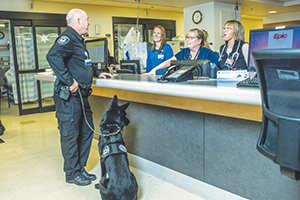By KEN LEISER
Sarge, a black German shepherd, and K9 Supervisor Pat McKenna began patrolling the corridors of Providence Sacred Heart Medical Center in Spokane, Wash., in early January. Providence Health Care said it believes it is the first health system in Washington state to use a K9 team as part of its security efforts.
Providence Health Care, which is part of Renton, Wash.-based Providence St. Joseph Health, is developing its K9 program to deter potential criminal activity and violence at its hospitals and health clinics. Although hospitals have employed security dogs for decades, the practice is still relatively rare. Just 12 percent of the 340 U.S. hospitals represented in the results of a research survey on security practices employed K9 teams as part of their security programs. The study was published in the November 2016 edition of Workplace Health & Safety.

Mike Hollingworth/© Providence Health Care
Providence Alaska Medical Center in Anchorage rolled out its K9 security program in late 2017. The facility is a member of the Providence St. Joseph system.
Providence Health Care Chief Operating Officer Peg Currie brought the idea of adding a dog to her system's security detail to the security leadership team a few years ago.
National statistics show that health care workers are subjected to violence more often than any profession outside of law enforcement, Providence Health Care officials said.
"People don't come to hospitals when they're in great shape. People come here with stress and a lot of problems," said Ryan Nelson, Providence Health Care's director of security.
The Occupational Safety and Health Administration reports that the rate of serious workplace violence incidents — those resulting in days off to recuperate — was more than four times greater in the health care industry than in private-sector workplaces on average from 2002 to 2013.
The most prevalent type of violence in the health care setting involves patients' or visitors' aggression against a health care worker, the Joint Commission reported in April 2018. In that same Sentinel Event Alert, the Joint Commission said three-quarters of aggravated assaults and 93 percent of overall assaults against health care workers were attributed to patients or visitors.
Health systems that employ security dogs do so with the hope that the novel presence of a wary canine might be enough to make an angry person regain his or her composure, thus de-escalating conflict and dissuading acts of aggression against staff.
Gaining notice
Within a few weeks of being on the job, McKenna and Sarge had defused a couple of potentially volatile situations involving Providence Sacred Heart patients, Nelson said. The sight of Sarge was a bit of a surprise to the patients, he added.
Nelson said McKenna "was able to carry on a good conversation and establish a rapport with the individuals in these cases and, in the end, one of them wanted to pet the dog."
Most days, McKenna and Sarge attract quite a bit of attention while completing their rounds in the hospital. During a typical shift, it is not unusual for the team to be stopped by more than 100 inquisitive patients, caregivers and visitors who want to know a little more about their work. McKenna figures he's handed out more than 1,000 trading cards featuring the duo's photographs and introductory information. The team works 40 hours a week. Sarge lives with McKenna when not on-duty.
A second dog — a Belgian Malinois — and its handler are now undergoing eight weeks of training and will begin patrols this spring at Providence Sacred Heart, Providence Holy Family Hospital and other Spokane facilities. For now, McKenna and Sarge focus on the Sacred Heart campus, particularly the emergency department and behavioral health units where security officers "see a lot of challenges at times," Nelson said.
Both security K9s also are trained to detect the presence of illegal drugs, explosive materials and gunpowder, Nelson said. Those skills would come into play only if there is a suspicious person or parcel requiring additional scrutiny.
Sarge, born in the Czech Republic in September 2017, was carefully selected from 10 candidates because of his highly sociable temperament as much as his ability to deter violence. McKenna said, "He's always in a social mood. But he's very aware of what's going on around him."
When someone approaches the two while they're on patrol, McKenna kneels beside Sarge and gives him a command before it's OK for the person to pet the dog. Sarge remains on a leash and under the control of McKenna at all times.
Nelson and McKenna said they have been a little surprised by the level of patient, visitor and caregiver enthusiasm for the K9 team, which was introduced at a January news conference.
Tips for employing a canine in a hospital's security detail Ryan Nelson, Providence Health Care's director of security, offers these tips for health systems starting a K9 security program:
|
